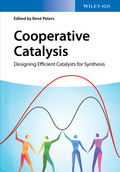Cooperative Catalysis
Designing Efficient Catalysts for Synthesis

1. Auflage März 2015
XXII, 428 Seiten, Hardcover
180 Abbildungen
Monographie
Kurzbeschreibung
The book provides an unique overview of the different concepts of cooperative catalysis, their corresponding modes of operation, advantages and pitfalls as well as applications in asymmetric synthesis.
Written by experts in the field, this is a much-needed overview of the rapidly emerging field of cooperative catalysis.
The authors focus on the design and development of novel high-performance catalysts for applications in organic synthesis (particularly asymmetric synthesis), covering a broad range of topics, from the latest progress in Lewis acid / Brønsted base catalysis to e.g. metal-assisted organo catalysis, cooperative metal/enzyme catalysis, and cooperative catalysis in polymerization reactions and on solid surfaces. The chapters are classified according to the type of cooperating activating groups, and describe in detail the different strategies of cooperative activation, highlighting their respective advantages and pitfalls. As a result, readers will learn about the different concepts of cooperative catalysis, their corresponding modes of operation and their applications, thus helping to find a solution to a specific synthetic catalysis problem.
Introduction
Lewis Acid - Brønsted Base Catalysis in Metalloenzymes
Hard Lewis Acid - Brønsted Base Cooperative Catalysis
Soft Lewis Acid - Brønsted Base Cooperative Catalysis
Conclusion
LEWIS ACID - LEWIS BASE CATALYSIS
Introduction
Lewis Acid and Lewis Base Activation
Addition to Carbonyl Compounds
Condensation Reactions
Morita-Baylis-Hillman Reactions
Epoxide Openings
Cyclization Reactions
Polymerizations
Conclusions and Outlook
COOPERATING LIGANDS IN CATALYSIS
Introduction
Chemically Active Ligands Assisting a Metal-Localized Catalytic Reaction
Redox-Active Ligands Assisting Metal-Based Catalysts
Summary
COOPERATIVE ENAMINE-LEWIS ACID CATALYSIS
Introduction
Reactions Developed through Cooperative Enamine-Lewis Acid Catalysis
Conclusion
HYDROGEN BONDING-MEDIATED COOPERATIVE ORGANOCATALYSIS BY MODIFIED CINCHONA ALKALOIDS
Introduction
The Emergence of Highly Enantioselective Base Organocatalysis
Hydrogen Bonding-Based
Conclusion and Outlooks
COOPERATION OF TRANSITION METALS AND CHIRAL BRØNSTED ACIDS IN ASYMMETRIC CATALYSIS
General Introduction
Cooperative Catalysis of Palladium(II) and a Brønsted Acid
Cooperative Catalysis of Palladium(0) and a Brønsted Acid
Cooperative Catalysis of a Rhodium Complex and a Brønsted Acid
Cooperative Catalysis of a Silver Complex and a Brønsted Acid
Cooperative Catalysis of a Copper Complex and a Brønsted Acid
Cooperative Catalysis of an Iridium Complex and a Brønsted Acid
Cooperative Catalysis of an Iron Complex and a Brønsted Acid
Perspective
COOPERATIVE CATALYSIS INVOLVING CHIRAL ION PAIR CATALYSTS
Introduction
Chiral Cation-Based Catalysis
Chiral Anion Based Catalysis
Synopsis
BIMETALLIC CATALYSIS: COOPERATION OF CARBOPHILIC METAL CENTERS
Introduction
Homobimetallic Catalysts
Heterobimetallic Catalysts
Synopsis
COOPERATIVE H2 ACTIVATION BY BORANE-DERIVED FRUSTRATED LEWIS PAIRS
Introduction
Mechanistic Considerations
General Considerations
Hydrogenation of Imines
Hydrogenation of Enamines and Silylenol Ethers
Hydrogenation of Heterocycles
Hydrogenation of Enones, Alkylidene Malonates, and Nitroolefins
Hydrogenation of Unpolarized Olefins and Polycyclic Aromatic Hydrocarbons
Summary
CATALYSIS BY ARTIFICIAL OLIGOPEPTIDES
Cooperative Catalysis by Short Peptides
Cooperative Catalysis by Supramolecular Systems
Cooperative Catalysis by Nanosystems
Conclusions
METALS AND METAL COMPLEXES IN COOPERATIVE CATALYSIS WITH ENZYMES WITHIN ORGANIC-SYNTHETIC ONE-POT PROCESSES
Introduction
Metal-Catalyzed In situ-Preparation of an Enzyme's Reagent (Cofactor) Required for the Biotransformation
Combination of a Metal-Catalyzed Racemization of a Substrate with a Stereoselective Biotransformation Toward a Dynamic Kinetic Resolution
Combinations of Metal Catalysis and Biocatalysis Toward "Consecutive" One-Pot Processes without Intermediate Isolation
Summary and Outlook
COOPERATIVE CATALYSIS ON SOLID SURFACES VERSUS SOLUBLE MOLECULES
Introduction
Tuning Cooperativity of Acid-Base Bifunctional Groups by Varying the Distance Between Them in a Soluble-Molecule Platform
Acid-Base Bifunctional Catalysts on Two-Dimensional Surfaces: Organic-Inorganic Materials
Cooperative Catalysis on Surfaces versus Soluble Molecular Platforms for Kinetic Resolution of Racemic Epoxides
Depolymerization of Biomass Polymers via Cooperative Catalysis on Surfaces
Conclusions
COOPERATIVE CATALYSIS IN POLYMERIZATION REACTIONS
Introduction
Cooperative Effects for the Polymerization of Lactide and Other Cyclic Esters
Polymerization Reactions of Vinyl Monomers with Frustrated Lewis Pairs
Zinc-Based Cooperative Catalysis of Epoxide/CO2 Copolymerization
Cooperative Mechanism of Epoxide/CO2 Copolymerization by Salen-Type Complexes
Summary
Index


